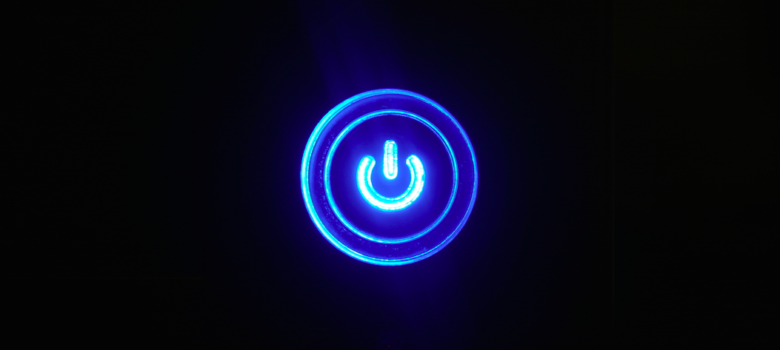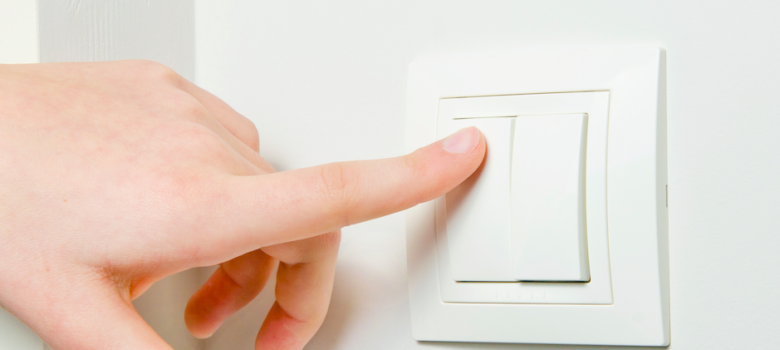
What is standby mode?
Most appliances today have a standby mode, which historically have been included on appliances to allow them to switch on very quickly or to power a display such as the time, while not actually fully switched on.
The most obvious appliance that uses this functionality is the television, which in the case of the two TVs in my home, have a little red light in the bottom right hand corner to show they are in ‘standby’. But other appliances that regularly have a standby mode include washing machines, dishwashers, microwaves, anything with a AC/DC charger (e.g laptop, printer, desktop computer).
The cost of leaving things on standby
Despite internet rumour to the contrary, leaving appliances on standby doesn’t use the same amount of electricity as when they are actually on but the older the model, the more electricity it is likely to use its in this mode.
New European legislation means that new appliances are limited to 1 watt when left in this mode. In the two examples below you can see the cost savings associated with a new item (e.g. a Sky HD box) and a TV that is 10 years old and uses 12 watts in standby mode.
New item
So if an item left on standby uses 1 watt an hour (i.e. it is brand new and adheres to the new 1 watt legislation), then it uses 1kWh for every 1000 hours it is on. There are 8760 hours in a year, so it will use 8.76kWh in a year. Currently 1kWh from one of the big 6-energy company costs 14 pence, so over a year that will cost £1.23 to do nothing!
TV (10 years old)
An old TV uses 12 watts an hour, so it uses 1kWh for every 83 hours it is on (in standby). There are 8760 hours in a year, so it will use 106kWh in a year, which at today’s prices equates to £15, again to do nothing.
How can I make savings?
According to the ‘Powering the nation’ study completed by Energy Saving Trust, between 9-16% of the electricity consumed in homes is used to power appliances when they are in this standby mode. On a bill of £500 this could account for as much as £80, which is a significant proportion when it doesn’t really achieve anything!

Likewise for things like charging mobile phones, if you charge it overnight, it will be fully charged after 2 hours, and then for the rest of the evening it is using electricity unnecessarily, so charge it during the day then you can turn off the charger when it is done (or even better charge it at work!).













When you make this comment, “Likewise for things like charging mobile phones, if you charge it overnight, it will be fully charged after 2 hours, and then for the rest of the evening it is using electricity unnecessarily, so charge it during the day then you can turn off the charger when it is done (or even better charge it at work” – Are you saying that when the phone is fully charged, the charger keeps “working”? How much does that cost, say for 6 hours of charging a fully charged phone?
Thanks.
Phil.
So there are two things to consider here Phil, firstly if a phone isn’t connected to the charger, a very small amount of current will still be pulled by the charger – barely noticeable, but there nevertheless.
Secondly – If you leave a phone plugged in (and this is the case with newer phones, but I am sure older phones charge differently!), then once the battery is fully charged, the charger will stop giving it power. When the phone drops to 97 / 98% again it will restart the charging process again and this will continue through the night. The best way of seeing the impact of a phone charger is using an energy monitor – this will show you in real terms how much electricity you are using in different scenarios.
My provider recommends unplugging charger as soon as your alert that is fully charged beeps. They said it can cause the battery to Bloat…it makes it bulge in the centre which has happened to my s4 and i never leave it anymore.
There a few points here
1) When he TV is on so that does not contribute to the standby time. Say 4hours a day * 365 = 1460
2) Most ‘Green’ people will have some Solar panels that will cover the Standby for an ave of 8 hours a day = 2920
There for TV etc standby cost is half or 61p
I have gone further, all phones, tablets and batteries are charged off grid from by Solar charged battery bank on a neat little tale in the house with USB and 12V outlets. So no standby costs for those.
It’s all a mind set, to maximize the Solar charging and turn things off at night. Charge Car during the day is sunny on Econ 7 if not. etc.
Wow. To be honest, I’d rather pay any of the above figures to have the convenience of my appliances left partially on so they load up in a second, rather than going to switch the plug on, and then waiting at least 10-20 seconds!
That kind of attitude is from people with good incomes or an illegal ‘job’ like drug dealer, not the millions on low incomes. Or those without any concern for the environment future generations. Save that power and try something more ethical and with the money- give it to a charity. if you’re on a PAYE income you can increase this amount of money by letting the charity claim the tax you paid. Drug dealers wouldn’t be on PAYE unless they also have a legal job, but they can still save that money and donate to their favourite charity (drug rehab?).
Shut up tit.
Ridiculous to say people whose attitide to less than a pound a year to leave a TV on standby are those of a drug dealer. Get off your high horse and realise even low income families would rather have convenience over a pound a year – and not everone who thinks that is a drud dealer. Idiot!
I agree totally chris
There is also the elemet of safety if you have young kids and you are constantly unplugging things they will be in there trying to plug things in ive noticed some tvs dont even have an actual on/off button anymore and sometimes its hard to get in behind tv/dvd/pc . But i switch of what i can ! BTW Drug dealer lol !!! its mostly just down to habit older generation will always unplug/switch off, it was part of your night time routine ,now you dont have to !!, young people wont think to do it, its like running the tap while you brush your teeth !!!! need to change habits ,educate not patrionise 🙂
I utilise LightwaveRF technology. My devices automatically power on prior to the times when I normally use them and switch off for the duration of time when I don’t use them. For example my TV has no power from 3am in the morning until just before I return from work the next night. This means that when I return home the TV is in standby for me to use without noticing that it just spent the day completely powered off. Each device is switched by a socket which draws 0.6W. Devices can be timer controlled, manually switched or controlled via an app over the internet if required.
With this I have reduced parasitic in the house to a continual 80Watts from 320Watts. Payback has been less than a year.
WOW THAT WAS JUST SO……………………SO BORING…………………….
WHO EVEN CARES ABOUT THIS KINDA STUFF!
Why are you even on this website? It’s kind of over your head maybe?
The kind of people who know when it is appropriate to capitalise letters.
Hi Aaron, it is becoming quite an issue for people but thanks for the blunt feedback!
Nothing uses 12Watts an hour. Or 1Watt an hour. They would use 12W or 1W. The SI Unit of power is J/s (W). Hours are not mentioned. Ever.
An electrical item will draw 12W (if it’s a 12W unit) and that means it will consume 12 Joules of energy per second. It’s still 12W however long it’s plugged in. If you leave it plugged in for 10 hours, it’s still consuming 12W, not 120W as you appear to intimate.
While joules and seconds are indeed SI units for energy and time, you appear unfamiliar with the kilowatt hour, which is also commonly used.
The kilowatt hour (symbol kWh) is a derived unit of energy equal to 3.6 megajoules. If the energy is being transmitted or used at a constant rate (power) over a period of time, the total energy in kilowatt-hours is the power in kilowatts multiplied by the time in hours.
Check your maths – 8760/1000 = 8.76: 8.76 x 14 pence =123 pence = £1.23 per year! ….NOT £123 !
Tony, the maths is correct, but the ‘dot’ may come across faint on your screen. The pages are going through a slight re-design and we should have new deployment middle of March, hopefully making the text come across sharper.
People who think this is nothing to be bothered about are ignorant. I came across this site because I want to save my electricity bill as I seem to use an astronomical amount. I have asked if my boyfriend will agree to turn everything off at the plug at night and take the plug out, for the month of June so that I can experiment the results.
He went immediately onto the attack of my personal items saying my iMac probably draws this and my pyrography machine draws that etc.. and I’m like WTF? He says equipment on stand-by only draws probably 1Watt and the whole flat probably costs about £2.30 per year if every thing is on stand-by. He obviously didn’t take into account that we would be using stand-by equipment during this year and that we will not be using everything for a whole year! Well yes of course my electric bill will be considerably reduced!
What I’m saying and asking from him, is that I don’t even want to spend that £2.30. If it’s saving money, I want to save 100% so turn everything off. Spend £2.30 or save £2.30 per year?… no brainer to me.
I want to help save our planet for the future and I am slowly getting there, doing my bit and my electricity bill was my next move. I was in shock. I didn’t realise how much I was actually paying. I feel like going back to the 80s when I was growing up and switch everything off if not in use, or maybe I should install the 50p machine again. 🙂
If you came across this site and you’ve stated some negativity, then why did you come across this site in the first place? If you have nothing positive to say or a real question to ask then take your negativity elsewhere and leave the comments to people who genuinely want to better themselves, increase awareness of our fragile planet and indeed learn/gain knowledge from others research.
I would like to know if there is a difference between turning off at the plug AND removing the plug, or just turning off at the plug, has any electrical draw difference?
Thanks.
Hi
I too would like to know if we have to pull the plug out. I’m disabled so pulling plugs out is difficult but flicking a switch isn’t
I sadly have several items that have to be on 24hrs my hospital bed and my wheelchair. And my mattress
I have a power extension as I can’t reach sockets with individual switches. Wondering if leaving on extension leads are expensive
Well said Helen!! Couldn’t have put it better myself.
Why are there sooooo many adverts to climb through before you get an answer. Lost interest in the end!
I do switch off bills are high enough I’m not prepared to waste energy
How much does it cost if cooker socket is on but cooker not used per hour.when plug is on, digital display on cooker is lit up. So how much would that cost per hour? Old house, needs rewiring at some point. Motherboard/meter definitely need updating..so will it cost more because its older meter etc? Thanks